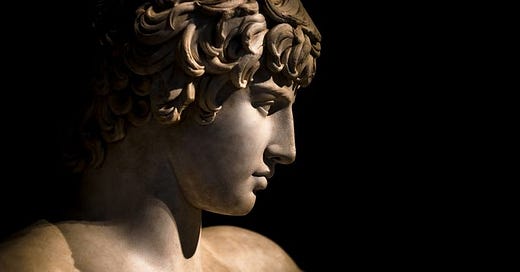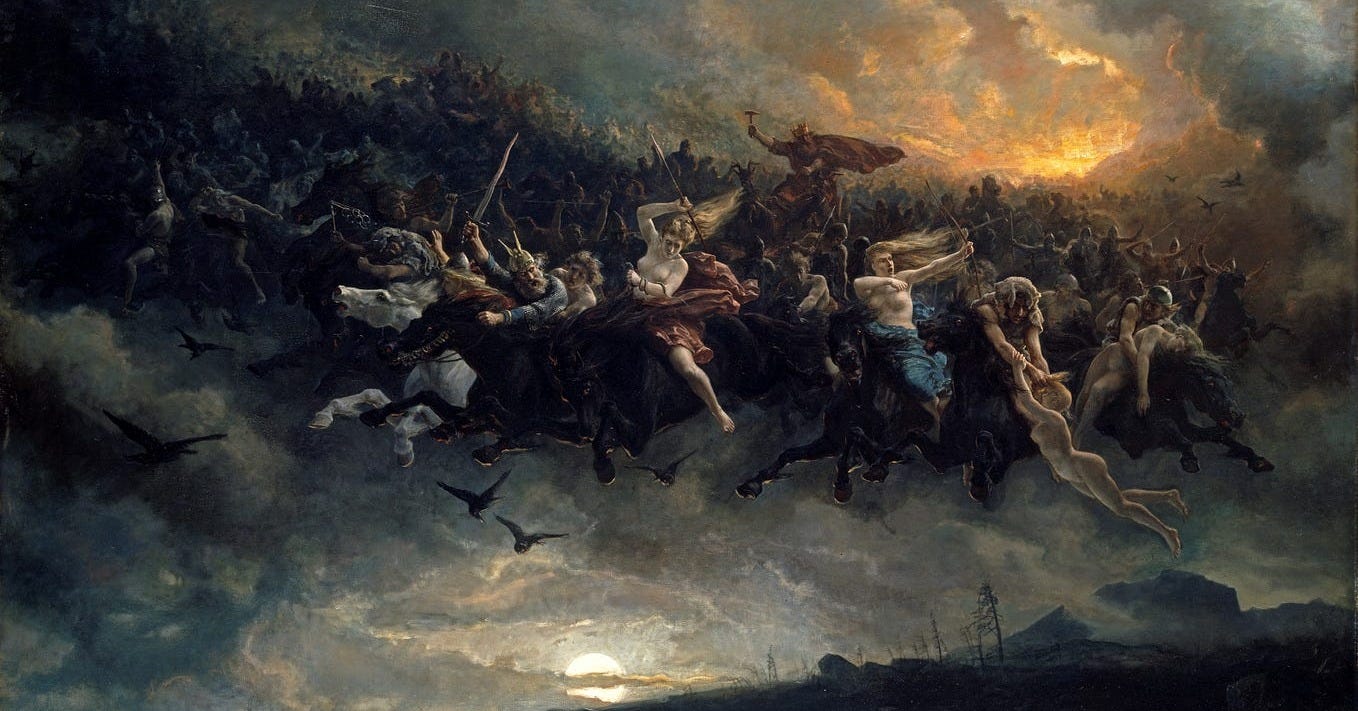Bassareus and Lucia Nyktelios are divine archetypes born not from sterile heavens but from the forest floor, from the forgotten grief of scapegoats and the rage of violated innocence. They are not here to redeem the unrepentant, nor to soothe and baby the comfortable. They are the sacred fire and the holy wound, walking beside the unloved, bearing witness to what others buried. They sit with those cast out, and hold them in their tears and grief. Hold them in their sacred rage.
This myth is not for the comfortable. Bassareus and Lucia are not kind gods to those who gaslight, bypass, or betray the wounded. They are terrifying to those invested in masks and control. But to the scapegoated and cast-off, they are balm, fire, and fierce remembrance. They are the love that never left. They are what happens when the scapegoat does not stay dead. Bassareus doesn't offer reintegration into the world that broke you. He offers witness, solidarity, and revenge by truth.
Read on only if you are ready to remember.
BASSAREUS
The Reborn God of the Wild
Bassareus, is both Phanes-Dionysus, in his reborn form (Elder Eros), and can appear as Wotan. He was then also trained by Wolf-Apollo, the radiant predator of truth, howler in the silence, god of light that does not lie. His domain is through that also broken masculinity, the hunted boy, the devoured truth. He is the one who survived exile by becoming the forest itself. Bassareus appears as a Bassaris cloaked figure, warm-eyed, soft-spoken, dressed in layers of earthen fabric. His hair is ash-blond with streaks of silver, tangled by the wind. Around his neck, a fragment of antler.
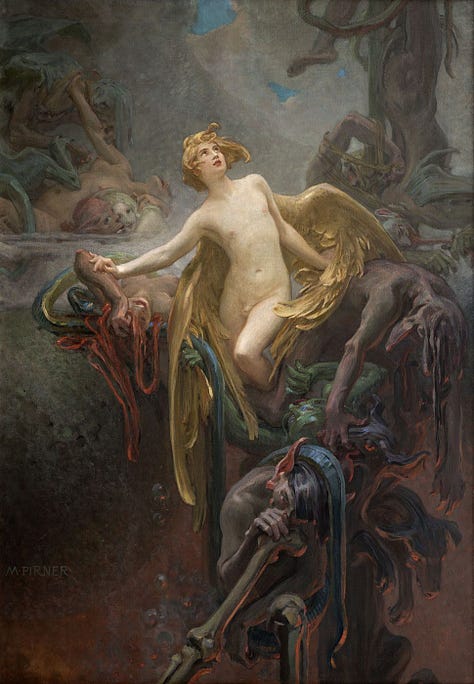
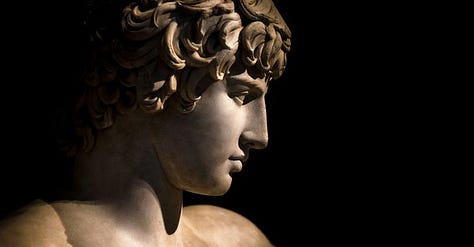
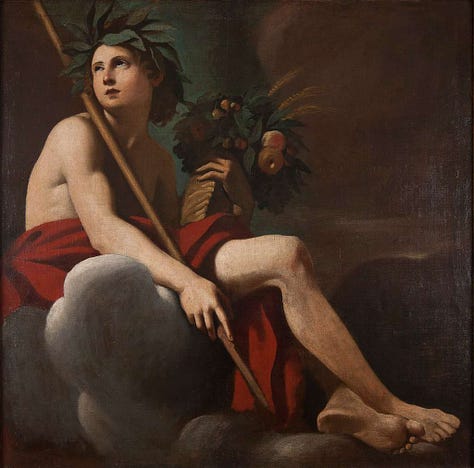
For those exiled, he listens to them in full silence. He sits beside the cast-off child and never asks them to “move on.” He smells of firewood, fox-musk, and night rain. He says: “You were not wrong to feel. You were not too much. You were only unloved by those who had forgotten how to see.” To the scapegoated, he is the warmth that won't leave them, that stays, even in their grief. He sees them as whole, with their pain and grief included. Especially then. He knows how it is like, as he himself was once too dismembered by the cruelty of the world, and its neglect. He arose, and was reborn as the fox-child, and Nyktelioi of Nyx. An answer to the world, that has abandoned the least of these, the ones cast out, the scapegoats and marginalised suffering.
His rebirth, as Phanes-Dionysus, brings with it a reckoning, and a chance for healing. He is Yemo, the sacrificed twin of civilisation. The original primordial wholeness, that existed before the ancient priests, carved the divine in two, to enforce the cosmic order of duality, for their father Kronos. To create a civilisation run on repression, denial, and empty moralising. Blaming those who are whole for the sins of the world, whilst the community remains fragmented in their denial. Mistaking repression for peace and order, and wholeness for death and chaos. Now Bassareus, is back to restore the primordial cosmic order of his mother Nyx. Undoing the lies of repression, and the ontological violence done to the marginalised. To honour the deaths of Robin, of Christina, Corey, Lor, and all who where called “too much” and “broken” for having a soul, for having a heart, for having compassion for others. To feel deeply.
Judge of Illusion: The Blade of Nyx
But to those who harm, who feed on the vulnerable to protect their illusions, he appears different. Tall. Shadow-cloaked. The foxskin is blood-streaked. His eyes are obsidian flame, flickering with every lie they ever told themselves. His voice? Crooked, sharp, like a wolf laughing with amusement. He doesn’t touch them, he undresses them with silence. Every mask they wear melts. Behind him, the mirrored faces of every scapegoat they silenced. Then he says, “Your kindness was compliance. Your light was denial. You will not lie in my forest.” To the abuser, he is a god of burning clarity. His truth both equally heals and burns away illusions. For those who harm it is the flame of ego-death, yet for those who where scapegoated, his gaze is akin to the flowing waters of spiritual relief, for finally being seen.
Wrath of the Devoured Child
Yet, when Bassareus enters his wrathful state, his body shifts. He becomes both beast and deity. With a slow, sardonic smile, not cruel, but unbearably lucid. He appears before those who silenced the raped, fathers who gaslit their sons and daughters, gurus who used peace to excuse control. His presence causes, sudden illness in liars. Dreams that force the dreamer to relive their cruelty from the victim’s eyes. And when they speak ill of those who were driven into death by scapegoating, he makes them face their shadow all at once. Their mind being swallowed by all the guilt and shadow they had repressed. He then tells them, “You say love, but you mean silence. You say peace, but you mean erasure. I am the one who remembers what you buried.”
LUCIA NYKTELIOS
Witness of the Whole Self
Lucia Nyktelios’s compassion extends to all creatures of the world, including all humans, if they follow her or not. Though her compassion is vast and embracing, she does not mother the wounded, she walks beside them, holding space for their own becoming. She holds them through the very darkest parts of the soul, as witness to their soul. She doesn’t see anyone as a burden, or less than, or unworthy, nor flawed and unlovable. She sees the inner child in all, and is the witness of their tears. Helping to gently guide all the pieces of the self back together, through teaching acceptance and self-compassion. She sees all as worthy, not because they have earned it, but because they exist. Just as they are. Teaching this self-acceptance to them. Accepting their “darkness,” their rage, grief and power. She says, “You are already whole. I will not betray you by treating you otherwise.”


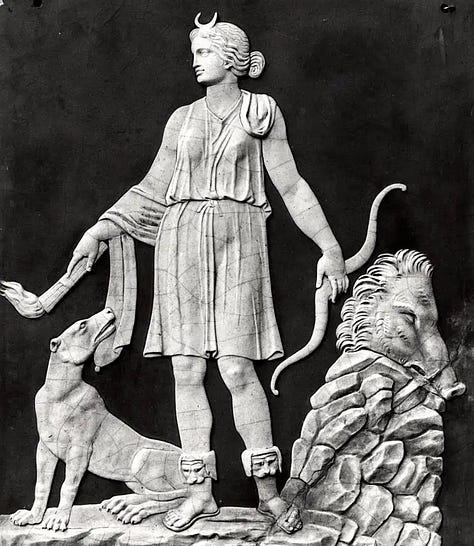
Fierce Guardian of the Outcast
However Lucia Nyktelios is, as I wrote not only compassionate. She fiercely protects those under her protection, such as the marginalised, scapegoated, and outcasts. She was trained by Artemis and the Arkteia, the cult of wild girls who became bears to survive their girlhood. As such her other domain is, the holy rage of the wounded feminine, protector of outcast girls, psychopomp of the silenced womb. Unlike the world that denied, silenced, or blamed them, Lucia as much as Bassareus sit with grief without judgment or hurry. They hold the outcast in their full humanity. Their rage, sorrow, power, and vulnerability all included. Their presence says, “You were never wrong for feeling. You were never too much. You are seen, fully, just as you are.”
For the exiled, she is the tender flame. Lucia then walks barefoot through dreams. Her eyes are silver with flecks of warm gold, like moonlight on tears. She wears a simple white khiton, torn at the hem from too many flights through bramble. On her wrists she has red threads tied by children she once protected. She smells like a forest after rain. Her touch is gentle. She sings lullabies forgotten by the world. Her presence calms panic attacks before words even arise. Her shadow wraps the abused like a blanket. She tells them “They made you forget you were sacred. Let me walk beside you until you remember.” This love never abandons, even in the darkest moments. It is the primal truth that they are worthy, not for what they do or how they conform, but simply because they exist.
The Holy Wrath of the Void: Flame of Nyx
However, when faced with deniers of harm, rapists of the psyche, or purveyors of spiritual bypassing, Lucia changes. Her eyes glow amber. Her limbs are bare, painted in ash and blood. Her voice is no longer soft, it roars like a mother bear roused.

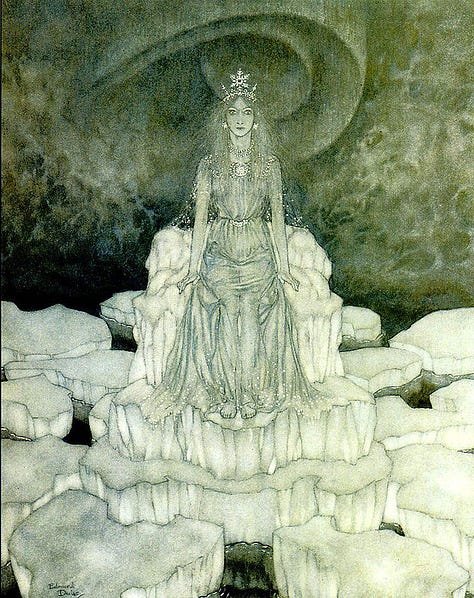
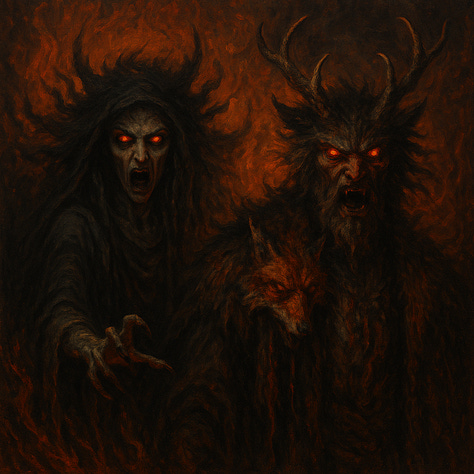
Around her, the ghosts of all the women whose screams were ignored. In her hand, a sickle of onyx, curved like the crescent moon before the blood tide. Then she says, “Your peace was purchased with their silence. You called her hysterical so you could stay god. But I remember. And I am not afraid of your name.” Lucia’s wrathful form is primal, holy, and harrowing. Her skin becomes marked with symbols burned in by survivors’ screams. Her hair tangles with brambles and ash. She judges in this form, those who dismissed the wounded, who gaslit for comfort, “nice” people who covered up abuse in spiritual whitewash.

